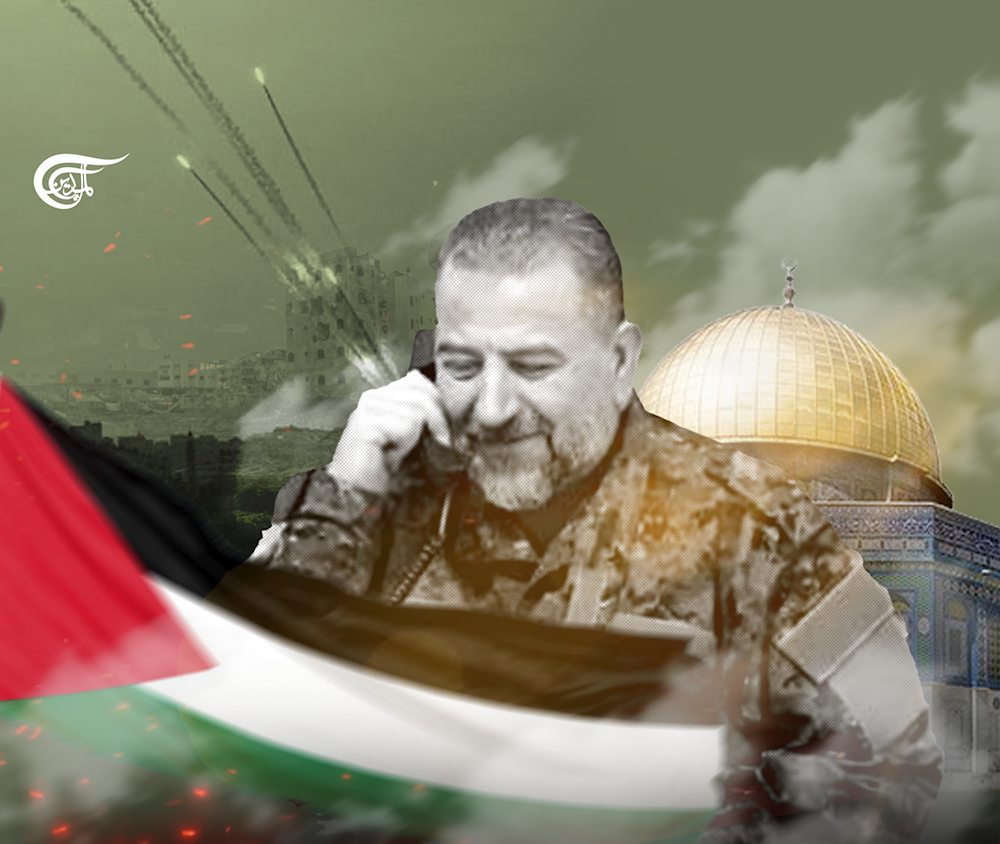Who is Saleh al-Arouri; Hamas Resistance leader killed by 'Israel'?
This article traces some of the greatest accolades of Hamas politburo Deputy Chief martyr Saleh al-Arouri, who set the spurred Resistance in the West Bank.
-

Martyr and late leader Saleh al-Arouri. (Al Mayadeen English; Illustrated by Hady Dbouk)
On the evening of January 2, 2024, the Israeli regime assassinated the Deputy Chief of Hamas' Political Bureau Sheikh Saleh al-Arouri, in Beirut Southern Suburb, Lebanon.
The chilling news of the great leader's martyrdom came after a series of Israeli threats, which reached their peak in August 2023. Israeli officials resented al-Arouri's direct years-long role in building up the capabilities of the Palestinian Resistance in the West Bank, which highlighted the fragility of Israeli security.
Building up West Bank Resistance
The Palestinian Islamic Resistance Movement, Hamas, mourned one of its most devout leaders, who endured 15+ years of imprisonment and was eventually forced out of Palestine and headed to Syria in 2010. Al-Arouri stayed in the neighboring Arab country, before moving to Turkey, Qatar, and Malaysia, eventually settling in the Southern Suburb of Beirut in Lebanon, where he resumed his revolutionary work.
A statement released by Hamas following the news of al-Arouri's assassination highlighted his leading political and military role both in the West Bank and Gaza. In fact, al-Arouri, born on August 19, 1966, played an integral role in setting up Hamas' military wing, al-Qassam Brigades, in the West Bank.
The leader's original birth name is Saleh Mohammad Suleiman Khaseeb. Nonetheless, akin to fellow families in the region, his unique distinction as "al-Arouri" is derived from his roots in the small town of Arura within the Ramallah district. This connection is precisely why he is recognized today as al-Arouri, which is interpreted as an individual descending from the town of Arura, in Arabic.
The martyr's roots in his town shaped his political career, in which he diligently and relentlessly worked to snatch the rights of his people from the hands of the occupiers. Al-Arouri deliberately embraced the legacy of past martyrs, aligning himself with the image of revolutionaries unyielding in the face of the criminal Israeli regime.
"Our blood and our souls are never more precious or dearer than any fallen martyr."
Martyr Sheikh Saleh al-Arouri
Al-Arouri's greatest accolades
The leader did not only contribute to the organization of Resistance cells in the West Bank and other fronts, but he also led negotiations for prisoner exchange deals that the Resistance imposed on the occupation.
After graduating from al-Khalil University in the West Bank, with a bachelor's degree in 1987 and studying Islamic Law (Shariah), al-Arouri made his way up the movement's ranks, eventually voted in as a member of its politburo in 2010.
The Resistance leader faced intermittent periods in captivity, as he was first administratively detained in the early 1990s by Israeli occupation forces, due to his activity within the Hamas movement. He was later freed, but then redetained and sentenced to 15 years in prison for establishing Resistance cells in the West Bank.
After completing his sentence, he was yet again detained and released in 2010, to be finally forced out of the country in the same year.
He then headed Hamas’ negotiating team in charge of completing the prisoner exchange deal in 2011 with the Israeli occupation, mediated by Egypt. Hamas dubbed the operation "Faithful to the Free" (Wafaa Al-Ahrar). Under the deal, Gilad Shalit, an Israeli soldier who was held captive by Hamas, was released in exchange for the release of 1,027 Palestinian prisoners from Israeli prisons, including the current leader of Hamas, Yahya al-Sinwar, among other prominent Palestinian figures.
On October 9, 2017, al-Arouri was elected as Deputy Head of Hamas' Political Bureau. One year later, the United States enlisted him under its infamous "terrorist list", and in 2021, he became the head of the Hamas movement in the West Bank.
A historic revolutionary
The Israeli occupation demolished the house of the senior Hamas leader in Aroura in 2014, and then once again this year, on October 27, shortly after Operation Al-Aqsa Flood, due to his direct involvement in the unprecedented ground attack.
Israeli occupation forces demolished the house of #Palestinian Resistance chief, Saleh al-Arouri, in the town of al-Aroura.#Palestine pic.twitter.com/D221J7SvCD
— Al Mayadeen English (@MayadeenEnglish) October 31, 2023
The leader's unblemished career made him a force to reckon with by Israeli officials, including Prime Minister Benjamin Netanyahu, who vowed to assassinate al-Arouri, to which he responded at the time, saying, "The Israeli threat against me will not change my convictions, and it will not have an impact on the path [that I have chosen]" in an exclusive interview for Al Mayadeen.
His assassination triggered a wave of condemnations and promises for retaliation, specifically from Palestinian Resistance factions, shedding light on the closely-knit relationship that al-Arouri had built with Palestinian cadres and his irrefutable popularity among Palestinians.
Read more: Exclusive - Al Arouri: Resistance Axis preparing for all-out war

 5 Min Read
5 Min Read










